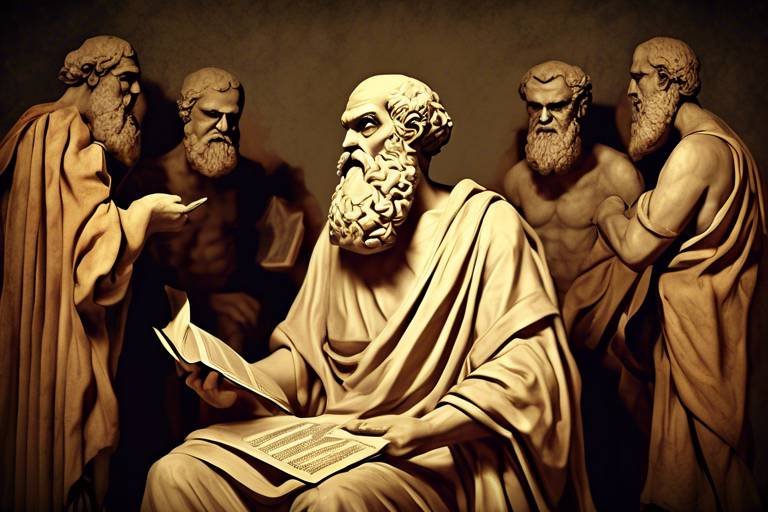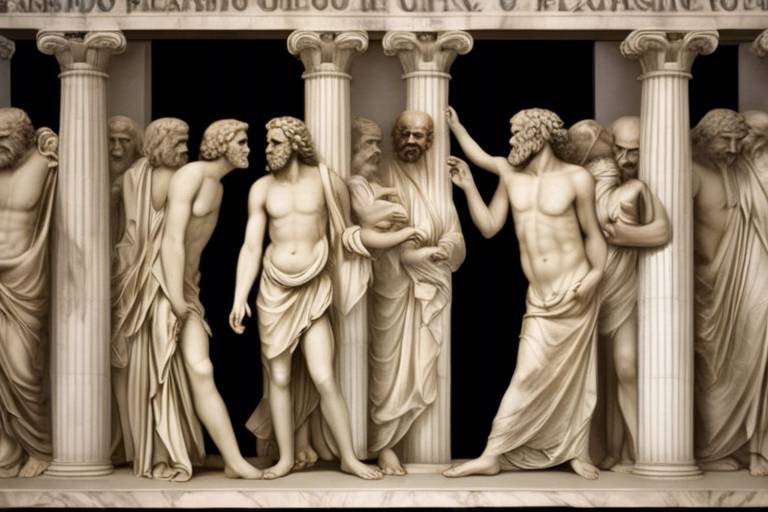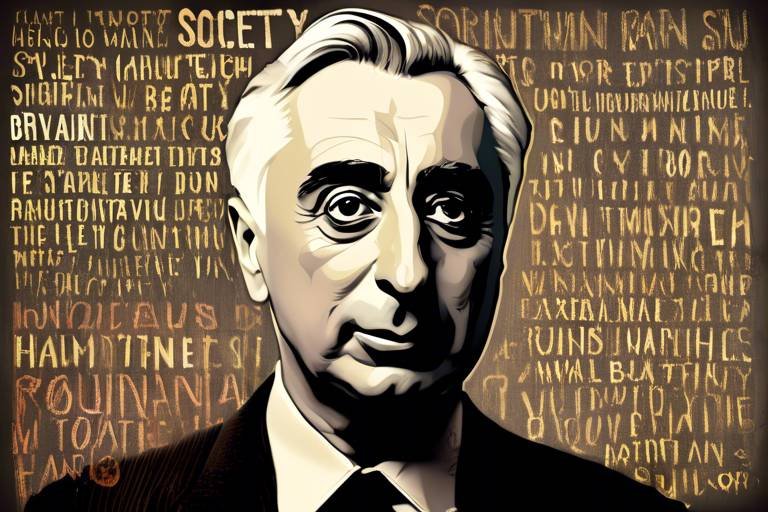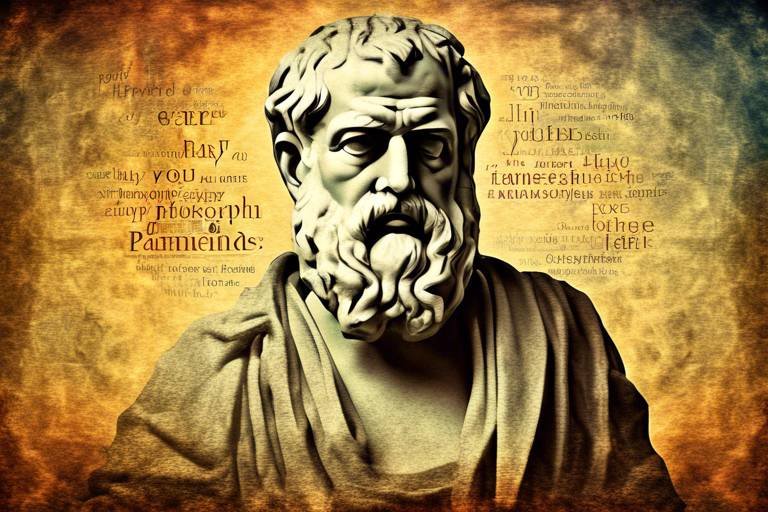The Analytical Genius of Bertrand Russell - A Review
When we think about the landscape of modern philosophy, one name that undeniably stands out is Bertrand Russell. His analytical genius reshaped the way we approach logic, mathematics, and even political discourse. Russell's profound impact can be traced through his groundbreaking works that not only challenged existing norms but also paved the way for future generations of thinkers. In this article, we will explore the remarkable contributions of Russell, delve into his philosophical ideas, and examine how his legacy continues to resonate in contemporary thought.
Bertrand Russell was born on May 18, 1872, into an aristocratic family in Trellech, Wales. His early life was marked by both privilege and personal tragedy, which played a significant role in shaping his worldview. After the death of his parents, Russell was raised by his maternal grandparents. This upbringing instilled in him a sense of independence and a thirst for knowledge. He attended Trinity College, Cambridge, where he was exposed to the works of influential philosophers such as Gottlob Frege and Georg Cantor. These early experiences ignited his passion for mathematics and logic, ultimately leading him to develop his own analytical framework.
Russell's philosophical contributions are vast and varied, but they primarily focus on two key areas: epistemology and metaphysics. His works laid the groundwork for modern analytic philosophy, addressing fundamental questions about knowledge, reality, and the nature of truth. One of his most significant contributions is the concept of logical atomism, which posits that the world is composed of independent facts. This idea not only influenced philosophy but also played a crucial role in the development of scientific thought.
Co-authored with Alfred North Whitehead, the Principia Mathematica is arguably one of Russell's most important works. Published between 1910 and 1913, this landmark text revolutionized the fields of logic and mathematics. It aimed to derive all mathematical truths from a well-defined set of axioms and inference rules, establishing a foundation for future developments in these disciplines. The ambitious nature of this work showcased Russell's analytical prowess and his commitment to clarity and precision in philosophical discourse.
Russell's concept of logical atomism proposed that the world consists of simple, independent facts that can be analyzed logically. This approach not only influenced philosophy but also had a profound impact on the development of scientific methodologies. By breaking down complex propositions into their atomic components, Russell encouraged a more rigorous examination of language and meaning, which remains relevant in contemporary philosophical debates.
Beyond his philosophical endeavors, Russell was a passionate advocate for social justice and peace. His political activism intertwined with his analytical insights, allowing him to address pressing moral issues of his time. Russell's commitment to pacifism and ethical reasoning was evident in his vocal opposition to war, particularly during World War I and the Cold War. He believed that philosophy should not exist in a vacuum but should actively engage with the challenges faced by society.
Russell's anti-war stance was a defining aspect of his political activism. He famously protested against World War I, arguing that the conflict was driven by imperialist ambitions rather than genuine concerns for justice. His writings during this period, including War Crimes in Vietnam, highlighted the moral implications of warfare and called for a more compassionate approach to international relations. Russell's unwavering commitment to peace and his willingness to challenge authority resonate with activists today.
Education was another cornerstone of Russell's activism. He emphasized the importance of fostering critical thinking and analytical skills among students, advocating for reforms that promote intellectual freedom and inquiry. Russell believed that a well-rounded education could empower individuals to question societal norms and contribute meaningfully to democratic discourse. His vision for education remains relevant, as we continue to grapple with issues of censorship and academic freedom in today's world.
Russell's ideas have significantly influenced a range of philosophers and theorists, establishing him as a pivotal figure in 20th-century thought and beyond. His analytical methods and insights have shaped the trajectory of modern philosophy, particularly in the realms of logic and epistemology. The impact of his work is evident in the emergence of movements such as logical positivism, which sought to ground philosophical inquiry in empirical verification.
The logical positivist movement, which gained traction in the early 20th century, drew heavily from Russell's work. Philosophers like A.J. Ayer and members of the Vienna Circle were influenced by his emphasis on the importance of language and logic in philosophical discourse. Russell's insistence on clarity and rigor remains a guiding principle in contemporary analytic philosophy.
Today, Russell's analytical methods continue to inform debates in philosophy, logic, and mathematics. His work has laid the groundwork for ongoing discussions about the nature of truth, knowledge, and the role of philosophy in addressing real-world issues. As we navigate the complexities of modern life, Russell's insights serve as a reminder of the power of critical thinking and the importance of engaging with the world around us.
- What is Bertrand Russell best known for? Bertrand Russell is best known for his contributions to logic, mathematics, and analytic philosophy, particularly through works like Principia Mathematica.
- How did Russell influence modern philosophy? Russell's emphasis on clarity and logical analysis laid the groundwork for movements like logical positivism and continues to shape contemporary philosophical discussions.
- What were Russell's views on education? Russell advocated for education that promotes critical thinking and intellectual freedom, believing it essential for a functioning democracy.
- Was Russell involved in political activism? Yes, Russell was a vocal advocate for peace and social justice, opposing wars and emphasizing the ethical responsibilities of individuals and governments.

Early Life and Education
Bertrand Russell was born on May 18, 1872, into an aristocratic family in Trellech, Wales. His early life was marked by the influence of his grandparents and parents, who were both intellectually stimulating figures. His father, a liberal politician, and his mother, a strong advocate for women's rights, instilled in him a sense of social responsibility and a thirst for knowledge. Can you imagine growing up in an environment where philosophical debates were as common as tea time? This unique upbringing laid the groundwork for Russell's future as a leading thinker.
Russell's formal education began at the age of 11 when he attended the prestigious Trinity College, Cambridge. At Cambridge, he was exposed to the works of great philosophers and mathematicians, which further ignited his passion for logic and analytical thinking. One might say that this was the crucible in which his analytical genius was forged. He studied under notable figures like G.E. Moore and John Maynard Keynes, who would profoundly influence his intellectual development.
During his time at Cambridge, Russell encountered the philosophical ideas of Immanuel Kant and David Hume, which challenged his understanding of knowledge and reality. This exposure to diverse philosophical perspectives encouraged him to adopt a critical approach to traditional beliefs. In his own words, Russell believed that "the good life is one inspired by love and guided by knowledge." This mantra would resonate throughout his life as he navigated the complexities of philosophy and ethics.
After graduating with a degree in mathematics and philosophy in 1893, Russell's pursuit of knowledge did not stop. He traveled extensively, immersing himself in different cultures and ideas. His travels in Europe and the United States provided him with a broader understanding of the world, which he would later incorporate into his philosophical works. It was during this time that he began to develop his ideas on logical atomism, a concept that would become a cornerstone of his philosophical contributions.
In the years that followed, Russell returned to academia, taking up various teaching positions, which allowed him to share his insights with students. He believed that education was not just about imparting knowledge but about fostering critical thinking and encouraging students to question the status quo. This belief would lead him to advocate for educational reforms that emphasized intellectual freedom, a theme that would echo throughout his life.
Russell's early life and education were not merely a backdrop for his later achievements; they were the very fabric that shaped his analytical mind. The combination of his aristocratic upbringing, rigorous academic training, and exposure to diverse philosophical ideas created a unique thinker who would challenge conventions and inspire generations. His journey from a curious child in Wales to a leading philosopher and social critic is a testament to the transformative power of education and the importance of nurturing analytical skills from an early age.
- What were the key influences on Bertrand Russell's early life?
Russell was significantly influenced by his grandparents and parents, who were intellectually engaged and socially conscious. - Where did Bertrand Russell study?
He studied at Trinity College, Cambridge, where he was exposed to the works of prominent philosophers and mathematicians. - What is logical atomism?
Logical atomism is a philosophical concept proposed by Russell, suggesting that the world consists of independent facts that can be analyzed logically.

Philosophical Contributions
Bertrand Russell's philosophical contributions are nothing short of revolutionary. He is often celebrated as a **foundational figure** in modern analytic philosophy, and his works have profoundly shaped the landscape of epistemology and metaphysics. But what exactly did he contribute? To put it simply, Russell's insights challenged traditional views and paved the way for a more rigorous approach to philosophical inquiry. His analytical methods emphasized clarity and precision, encouraging philosophers to scrutinize their assumptions and arguments with a fine-tooth comb.
One of the most significant aspects of Russell's philosophy is his commitment to **logical analysis**. He argued that many philosophical problems stem from misunderstandings of language and logic. By dissecting language and its usage, he believed we could dissolve many of these philosophical conundrums. This approach not only influenced philosophy but also had a ripple effect across various disciplines, including mathematics, linguistics, and cognitive science. In essence, Russell taught us that the way we articulate our thoughts can profoundly affect our understanding of the world.
Russell's contributions can be categorized into several key areas, each highlighting his analytical prowess:
- Epistemology: Russell explored the nature of knowledge, belief, and truth. He famously distinguished between knowledge by acquaintance and knowledge by description, shedding light on how we come to know things.
- Metaphysics: His work challenged the metaphysical assumptions of his predecessors, advocating for a more scientific approach to understanding reality.
- Philosophy of Language: Russell's theories on definite descriptions and his analysis of propositions laid the groundwork for future developments in the philosophy of language.
One of his landmark works, Principia Mathematica, co-authored with Alfred North Whitehead, is a testament to his analytical genius. This monumental text sought to ground mathematics in logical foundations, demonstrating that mathematical truths could be derived from logical axioms. The impact of this work cannot be overstated; it not only revolutionized the fields of logic and mathematics but also inspired a generation of philosophers to pursue the connections between these disciplines.
Another significant contribution is his concept of **logical atomism**, which posits that the world consists of independent facts that can be represented through logical propositions. This idea not only influenced philosophers but also had a profound impact on the development of scientific thought. By breaking down complex ideas into simpler, atomic components, Russell provided a framework for analyzing and understanding the complexities of reality.
In summary, Bertrand Russell's philosophical contributions laid the groundwork for modern analytic philosophy. His emphasis on logical analysis, clarity of language, and the interplay between knowledge and reality continues to resonate with scholars and thinkers today. As we navigate the complexities of contemporary philosophical discourse, Russell's legacy remains a guiding light, reminding us that **clarity and precision** are essential in the pursuit of truth.
- What is Bertrand Russell known for? Bertrand Russell is best known for his contributions to logic, mathematics, and analytic philosophy, particularly through works like Principia Mathematica.
- How did Russell influence modern philosophy? Russell's emphasis on logical analysis and clarity in language has significantly shaped contemporary philosophical methods and discussions.
- What is logical atomism? Logical atomism is a philosophical theory proposed by Russell that suggests the world is made up of independent facts that can be represented in logical propositions.
- Why is Principia Mathematica important? This work revolutionized the foundations of mathematics by establishing a logical basis for mathematical truths, influencing both philosophy and mathematics profoundly.

Principia Mathematica
, co-authored by Bertrand Russell and Alfred North Whitehead, is often hailed as one of the most significant works in the realm of logic and mathematics. Published between 1910 and 1913, this monumental three-volume work aimed to derive all mathematical truths from a well-defined set of axioms and inference rules, a task that was both ambitious and groundbreaking. The authors sought to show that mathematics could be reduced to logic, a concept that was revolutionary at the time and laid the foundation for what we now refer to as mathematical logic.
At its core, introduced a formal language that allowed for the precise expression of mathematical concepts, which was a significant departure from the more informal methods used previously. This formalization not only enhanced clarity but also provided a rigorous framework for mathematical proofs. The work is famous for its notation, some of which is still in use today. For instance, the symbolic representation of logical operations and quantifiers in the text has become a standard in mathematical logic.
One of the most striking features of is the way it tackles the concept of infinity. Russell and Whitehead explored the implications of infinite sets and the paradoxes that arise from them, such as Russell's Paradox, which questions the nature of sets that can contain themselves. This exploration not only advanced mathematical theory but also had profound implications for philosophy, particularly in the areas of epistemology and the philosophy of mathematics.
Moreover, is often viewed as a precursor to modern computer science. The logical structure and formal language developed in this work paved the way for the development of programming languages and algorithms. Think of it like laying the tracks for a train; without those foundational principles, the journey into the digital age might have taken a much different path.
In summary, is more than just a book; it is a monumental achievement that reshaped the landscape of logic and mathematics. Its influence extends beyond academia, impacting various fields including computer science, linguistics, and even cognitive science. The rigorous approach to logic and the quest for clarity in mathematical expression continue to inspire scholars and students alike, ensuring that Russell's legacy endures in contemporary thought.
- What is the main purpose of Principia Mathematica?
The main purpose is to establish a logical foundation for mathematics by deriving mathematical truths from a set of axioms and logical inference rules. - Who were the authors of Principia Mathematica?
The work was co-authored by Bertrand Russell and Alfred North Whitehead. - Why is Principia Mathematica significant?
It is significant because it revolutionized the fields of logic and mathematics, providing a formal language and framework for mathematical proofs that is still relevant today. - How did Principia Mathematica influence modern philosophy?
The work influenced modern philosophy by addressing key issues in logic and mathematics, leading to developments in various philosophical movements, including logical positivism.

Logical Atomism
Bertrand Russell's concept of is nothing short of revolutionary. At its core, this philosophical framework suggests that the world is composed of a series of independent facts or "atoms" of knowledge. Imagine these facts as the fundamental building blocks of reality, each standing alone but also interconnecting to form a larger picture. This idea not only reshaped philosophy but also had profound implications for the development of scientific thought.
Russell proposed that by breaking down complex propositions into simpler, more manageable components, we could better understand the structure of reality itself. This perspective was groundbreaking because it challenged the then-dominant view that complex entities could only be understood in their entirety. Instead, through logical atomism, he argued that we could dissect these entities into their simplest forms, leading to clearer insights and more precise reasoning.
One of the most striking aspects of logical atomism is its emphasis on language and its relationship to reality. Russell believed that the way we talk about facts directly influences our understanding of them. He famously stated that the world consists of facts, not things, which underscores the importance of language in shaping our perceptions. In this light, logical atomism serves as a bridge between philosophy and science, providing a framework for analyzing language that can be applied to scientific inquiry.
To illustrate the principles of logical atomism, consider the following table that highlights key features:
| Feature | Description |
|---|---|
| Independence of Facts | Each fact exists independently and does not rely on the existence of other facts. |
| Simplification | Complex propositions can be broken down into simpler components for better understanding. |
| Language and Reality | The way we articulate facts influences our comprehension of the world. |
This approach to understanding reality has not only influenced philosophers but has also had a lasting impact on various fields, including science, mathematics, and logic. By advocating for a clear and precise analysis of language, Russell paved the way for future thinkers to explore the intricate relationships between language, thought, and the world around us. His work in logical atomism remains a cornerstone of analytic philosophy, encouraging us to question the very foundations of our understanding.
Ultimately, logical atomism invites us to embrace a more analytical approach to knowledge, prompting us to ask: What are the fundamental truths that underpin our beliefs? By breaking down our assumptions into their simplest forms, we can engage in a more rigorous and meaningful discourse, whether in philosophy, science, or everyday life.
- What is logical atomism? Logical atomism is a philosophical theory proposed by Bertrand Russell, asserting that the world consists of independent facts that can be analyzed into simpler components.
- How did logical atomism influence modern philosophy? It laid the groundwork for analytic philosophy, emphasizing clarity in language and thought, and influencing subsequent movements like logical positivism.
- Why is language important in logical atomism? Russell believed that the structure of language shapes our understanding of reality, making it crucial for accurate philosophical and scientific analysis.

Political Activism
Bertrand Russell was not just a philosopher confined to the ivory towers of academia; he was a vocal advocate for social justice, peace, and nuclear disarmament. His analytical mind, which dissected the complexities of logic and philosophy, also turned towards the pressing moral issues of his time. Russell believed that philosophy should not only be a theoretical pursuit but should also engage with the real-world challenges that humanity faces. This belief drove him to take a stand on various political issues, often at great personal risk.
During World War I, Russell's pacifist stance put him at odds with the prevailing sentiments of his society. He famously declared that war was a manifestation of human folly and that it only perpetuated suffering. His opposition to the war led to his imprisonment in 1918, a testament to his unwavering commitment to his principles. This courageous act of dissent resonated deeply with those who shared his vision of a more peaceful world. Russell's anti-war activism didn't stop there; he continued to speak out against military conflicts throughout his life, including his vocal opposition to the Vietnam War and the nuclear arms race during the Cold War.
Russell's activism extended beyond mere opposition to war. He was a passionate advocate for education, believing it to be a fundamental right that should foster critical thinking and inquiry. He argued that a well-educated populace is essential for a functioning democracy, as it equips individuals with the analytical skills necessary to make informed decisions. In his view, education should not be a tool for indoctrination but rather a means to empower individuals to challenge the status quo and engage in meaningful discourse. To this end, he called for reforms that would promote intellectual freedom in educational institutions.
Moreover, Russell's activism was intertwined with his philosophical beliefs. He often emphasized the importance of reason and rational discourse in political debates. He believed that many societal issues could be resolved through logical analysis and open dialogue. This perspective is evident in his writings and public speeches, where he urged people to approach contentious issues with a spirit of inquiry rather than dogmatism. For Russell, engaging in political activism was not just about advocating for specific causes; it was about fostering a culture of critical thinking and rationality.
In summary, Bertrand Russell's political activism was a natural extension of his analytical philosophy. His commitment to pacifism, education, and rational discourse not only shaped his own life but also left an indelible mark on society. By intertwining his philosophical insights with his activism, Russell demonstrated that the pursuit of knowledge and the quest for social justice are deeply interconnected. His legacy as a thinker and activist continues to inspire those who seek to challenge injustice and promote peace in an increasingly complex world.
- What were Bertrand Russell's main contributions to political activism?
Russell was a strong advocate for peace, social justice, and education reform, often using his platform to speak out against war and promote rational discourse in political matters. - How did Russell's philosophy influence his activism?
His analytical approach to philosophy led him to believe in the importance of reason and critical thinking, which he applied to social and political issues. - Why was Russell imprisoned during World War I?
He was imprisoned for his outspoken pacifist views, which were considered controversial at the time, as they went against the prevailing pro-war sentiment.

Anti-War Stance
Bertrand Russell was not just a philosopher locked away in the ivory tower; he was a passionate advocate for peace and social justice. His was a defining aspect of his life, particularly during tumultuous periods like World War I and the Cold War. Russell believed that war was not only a moral failure but also a profound misunderstanding of human nature and society. He often argued that the horrors of war could be avoided through rational discourse and ethical reasoning, highlighting the need for humanity to seek peaceful solutions to conflicts.
During World War I, Russell's opposition to the war was particularly vocal. He saw the conflict as a senseless slaughter, driven by nationalistic fervor rather than any just cause. His activism led to his imprisonment in 1918 for anti-war protests, a testament to his unwavering commitment to his beliefs. Russell famously stated, “War does not determine who is right—only who is left.” This quote encapsulates his view that wars often leave behind devastation and suffering without resolving the underlying issues that sparked the conflict in the first place.
In the years following World War I, Russell continued to advocate for peace, particularly during the Cold War era. He recognized the existential threat posed by nuclear weapons and became a leading voice in the campaign for nuclear disarmament. Russell co-founded the Campaign for Nuclear Disarmament (CND) in the UK, arguing that the arms race was not only dangerous but also a moral catastrophe. He believed that the proliferation of nuclear weapons posed a threat to humanity itself, and he urged world leaders to prioritize diplomacy over military might.
Russell's anti-war activism was not limited to just his philosophical writings; he actively participated in protests, wrote letters to world leaders, and engaged in public debates. His passion for peace was intertwined with his belief in the importance of education and critical thinking. He argued that a well-informed populace would be less likely to support wars and more inclined to seek peaceful resolutions. In his view, education was a powerful tool for fostering a culture of understanding and dialogue, which could ultimately lead to a more peaceful world.
In summary, Bertrand Russell's anti-war stance was a crucial part of his legacy. His commitment to peace and social justice, combined with his analytical skills, allowed him to address complex moral issues with clarity and conviction. He understood that the fight against war was not just a political issue but a deeply philosophical one, rooted in our understanding of humanity and ethics. Through his writings and activism, Russell challenged us all to reconsider our views on war and to strive for a more peaceful existence.
- What motivated Bertrand Russell's anti-war activism?
Russell was motivated by a deep belief in human rationality and ethics, seeing war as a failure of both. His experiences during World War I profoundly shaped his views on the destructiveness of conflict. - How did Russell express his opposition to war?
He expressed his opposition through writings, public speeches, and active participation in protests, including his imprisonment for anti-war activities during World War I. - What impact did Russell's anti-war stance have on society?
His activism inspired many and contributed to movements for peace and nuclear disarmament, influencing both public opinion and policy in the mid-20th century.

Advocacy for Education
Bertrand Russell was not just a philosopher; he was a passionate advocate for education as a means to foster critical thinking and analytical skills. He believed that education should not merely be about rote memorization or passive learning but should instead encourage inquiry and intellectual freedom. Russell famously stated, "The good life is one inspired by love and guided by knowledge," highlighting his conviction that knowledge is essential for a fulfilling life.
Russell's advocacy for education was rooted in his understanding of its transformative power. He argued that an effective education system should aim to develop independent thinkers who can question societal norms and challenge prevailing ideologies. He was critical of traditional education systems that stifled creativity and curiosity, advocating instead for a curriculum that embraced diversity and open-mindedness.
In his writings, Russell proposed several key reforms aimed at enhancing educational practices:
- Encouragement of Critical Thinking: Russell emphasized the importance of teaching students how to think critically rather than what to think. He believed that fostering a questioning attitude would empower learners to engage deeply with the world around them.
- Promotion of Intellectual Freedom: He argued for an educational environment where students could freely explore ideas without fear of censorship or authoritarian control. This freedom, he posited, is essential for genuine learning.
- Interdisciplinary Learning: Russell advocated for a curriculum that integrates various fields of study, allowing students to see connections between disciplines and understand complex issues from multiple perspectives.
Moreover, Russell's commitment to education extended beyond the classroom. He was an outspoken critic of educational inequality and worked towards making education accessible to all, regardless of socioeconomic status. He believed that education should be a right, not a privilege, and that society has a responsibility to provide quality education to every individual.
In summary, Bertrand Russell's advocacy for education was a crucial aspect of his legacy. His ideas continue to inspire educators and reformers today, reminding us that education is not simply about imparting knowledge but about nurturing curiosity, creativity, and a lifelong love for learning. As we reflect on his contributions, we are challenged to rethink our own educational practices and strive for a system that truly prepares individuals to engage thoughtfully with the world.
- What was Bertrand Russell's main philosophy regarding education?
Russell believed that education should foster critical thinking, intellectual freedom, and creativity, rather than rote memorization. - How did Russell advocate for educational reforms?
He proposed changes that encouraged questioning, interdisciplinary learning, and accessibility to education for all, emphasizing the importance of nurturing independent thinkers. - Why is Bertrand Russell's advocacy for education still relevant today?
His ideas remind us of the need for educational systems that promote curiosity and critical engagement, which are essential in our rapidly changing world.

Influence on Later Thinkers
Bertrand Russell's intellectual legacy is nothing short of monumental. His ideas have not only shaped the landscape of philosophy but have also cast a long shadow over various fields, influencing countless thinkers who followed in his footsteps. One of the most remarkable aspects of Russell's influence is how his analytical methods and philosophical inquiries have permeated diverse areas of thought, from mathematics to political theory.
To understand the depth of Russell's impact, we can look at several key figures who were inspired by his work. For instance, his contributions to logic and philosophy laid the groundwork for the logical positivism movement. This movement, which emerged in the early 20th century, sought to synthesize scientific rigor with philosophical inquiry. Philosophers such as A.J. Ayer and members of the Vienna Circle drew heavily from Russell's ideas, particularly his insistence on clarity, precision, and the importance of language in philosophical discourse.
Russell's analytical approach encouraged later thinkers to dissect complex philosophical problems into more manageable components. This method, often likened to breaking down a puzzle into its individual pieces, allowed for a clearer understanding of intricate issues. As a result, his influence can be seen in the works of numerous philosophers who followed, such as Gilbert Ryle, W.V.O. Quine, and Peter Strawson, all of whom built upon Russell's foundational ideas to explore new territories in philosophy.
Moreover, Russell's emphasis on empirical verification and the importance of logical analysis has resonated beyond philosophy into the realms of science and mathematics. His collaborative work, particularly the seminal Principia Mathematica, co-authored with Alfred North Whitehead, revolutionized the foundations of mathematics and logic. This text not only laid the groundwork for future developments in these fields but also inspired mathematicians and logicians to explore the relationships between mathematical truths and logical reasoning.
In addition to his influence on logic and philosophy, Russell's political activism and ethical reasoning have left a lasting mark on social and political theory. His outspoken views on war, social justice, and education have inspired generations of activists and thinkers who grapple with the moral implications of their actions in a complex world. Russell's ability to intertwine analytical philosophy with pressing social issues serves as a powerful reminder of the relevance of philosophical inquiry in addressing real-world challenges.
To illustrate the breadth of Russell's influence, consider the following table that highlights key thinkers and their contributions:
| Thinker | Contribution | Influence from Russell |
|---|---|---|
| A.J. Ayer | Logical Positivism | Empirical verification and language analysis |
| W.V.O. Quine | Naturalized Epistemology | Critique of the analytic-synthetic distinction |
| Gilbert Ryle | Ordinary Language Philosophy | Clarity in philosophical language |
| Peter Strawson | Descriptive Metaphysics | Revisiting Russell's ideas on reference and truth |
In summary, Bertrand Russell's analytical genius has not only shaped the course of 20th-century philosophy but has also provided a rich foundation for future generations of thinkers. His ability to tackle complex issues with clarity and precision continues to inspire scholars across various disciplines, ensuring that his legacy endures in contemporary thought.
- What is the main contribution of Bertrand Russell to philosophy?
Russell's main contribution lies in his development of analytical philosophy, particularly through his work in logic and the philosophy of language. - How did Russell influence modern science?
His emphasis on logical analysis and empirical verification has significantly impacted the philosophy of science, encouraging scientists to adopt rigorous methods in their inquiries. - What is logical positivism?
Logical positivism is a philosophical movement that emerged in the early 20th century, advocating for the verification of statements through empirical observation and logical analysis.

Impact on Logical Positivism
Bertrand Russell's influence on the logical positivism movement is nothing short of monumental. His rigorous approach to philosophy and emphasis on logical clarity laid the groundwork for a new wave of thinkers who sought to ground their ideas in empirical evidence and logical reasoning. The logical positivists, primarily associated with the Vienna Circle, took Russell's principles and ran with them, advocating for a philosophy that dismissed metaphysical speculation as meaningless. This was a radical shift in philosophical discourse, and it was largely inspired by Russell's earlier works.
One of the key tenets of logical positivism is the verification principle, which asserts that a statement is only meaningful if it can be empirically verified or is tautological. Russell's analytical methods provided a robust framework that helped shape this principle. His insistence on clarity and precision in language allowed philosophers to dissect complex ideas and reduce them to their fundamental components. This analytical approach was vital for logical positivists who aimed to eliminate ambiguity and confusion in philosophical discussions.
Furthermore, Russell's work on Principia Mathematica, co-authored with Alfred North Whitehead, was instrumental in demonstrating how mathematical logic could be used to analyze philosophical problems. The logical positivists adopted these methods, applying them to a range of philosophical inquiries, from ethics to language. They viewed Russell as a precursor to their movement, and his ideas acted as a bridge between traditional philosophy and the modern scientific approach.
To illustrate the connection between Russell and logical positivism, consider the following table that highlights key contributions:
| Contribution | Description | Impact on Logical Positivism |
|---|---|---|
| Principia Mathematica | A foundational text in mathematical logic. | Provided tools for logical analysis and verification. |
| Logical Atomism | The idea that the world consists of independent facts. | Influenced the positivists' focus on empirical verification of statements. |
| Emphasis on Language | Clear and precise use of language in philosophy. | Encouraged the logical positivists to develop a rigorous linguistic framework. |
Russell's legacy within logical positivism is also evident in the works of philosophers like A.J. Ayer, who acknowledged the profound impact Russell had on their thinking. Ayer's book, Language, Truth and Logic, embodies many of the principles Russell championed, particularly the rejection of metaphysical claims as non-verifiable. This movement not only transformed philosophy in the 20th century but also influenced various fields, including linguistics, cognitive science, and even computer science, where logical structures are fundamental.
In summary, Bertrand Russell's analytical genius not only shaped his own philosophical endeavors but also paved the way for logical positivism. His emphasis on clarity, empirical verification, and logical rigor continues to resonate in contemporary philosophical discussions, ensuring that his contributions remain relevant in an ever-evolving discourse.
- What is logical positivism? Logical positivism is a philosophical movement that emphasizes the importance of empirical verification and logical analysis in determining the meaning of statements.
- How did Bertrand Russell influence logical positivism? Russell's analytical methods and emphasis on clarity in language provided a foundational framework that logical positivists built upon.
- What is the verification principle? The verification principle states that a statement is meaningful only if it can be empirically verified or is a tautology.
- Who are some key figures associated with logical positivism? Important figures include A.J. Ayer, Rudolf Carnap, and members of the Vienna Circle.

Legacy in Contemporary Philosophy
Bertrand Russell's contributions to philosophy extend far beyond his own lifetime, leaving an indelible mark on contemporary thought. His analytical methods have become cornerstones in various fields, influencing not only philosophers but also scientists, mathematicians, and even political theorists. It's fascinating to consider how a thinker from the early 20th century can still resonate so profoundly in our modern intellectual landscape. Have you ever wondered why some ideas stick around while others fade into obscurity? Russell's legacy is a testament to the power of clear reasoning and rigorous analysis.
One of the most significant aspects of Russell's legacy is his role in shaping the discourse around logical positivism. This movement, which emerged in the early 20th century, sought to synthesize scientific rigor with philosophical inquiry. Russell's emphasis on the importance of language and its relation to reality laid the groundwork for thinkers like A.J. Ayer and the members of the Vienna Circle. These philosophers adopted and adapted Russell's ideas, pushing the boundaries of what philosophy could achieve by focusing on verifiable statements and empirical evidence.
Moreover, Russell's influence is evident in the realm of epistemology, where his explorations into knowledge and belief continue to spark debates. His famous distinction between knowledge by acquaintance and knowledge by description has provided a framework for understanding how we come to know things. This distinction is not merely academic; it has practical implications for how we engage with the world around us. For instance, consider how your personal experiences shape your beliefs about abstract concepts like justice or freedom. Russell's insights encourage us to reflect critically on the sources of our knowledge.
In addition to logical positivism, Russell's analytical philosophy has permeated various branches of contemporary philosophy, including ethics and political philosophy. His advocacy for a rational approach to moral issues has inspired countless discussions on the nature of ethics in a rapidly changing world. The ethical dilemmas we face today—ranging from climate change to technological advancements—require the kind of analytical clarity that Russell championed. His belief that philosophy should engage with real-world problems resonates with many modern philosophers who strive to make their work relevant to everyday life.
As we reflect on Russell's impact, it's essential to recognize that his legacy is not static; it evolves as new thinkers build upon his ideas. The ongoing discussions about the implications of his work reveal a dynamic interplay between past and present. For example, contemporary debates surrounding the philosophy of language often draw on Russell's theories about reference and meaning. His insights into how language shapes our understanding of the world continue to inform discussions in linguistics, cognitive science, and artificial intelligence.
In conclusion, Bertrand Russell's legacy in contemporary philosophy is a rich tapestry woven from his analytical rigor, ethical considerations, and commitment to clarity. His ideas remain vital in addressing the complexities of modern life, encouraging us to think critically and engage thoughtfully with the world around us. As we navigate the challenges of today, let us remember Russell's call for a philosophy that is not just theoretical but deeply connected to our lived experiences.
- What was Bertrand Russell's main contribution to philosophy?
Russell's primary contribution was his development of analytical philosophy, which emphasized clarity, logical reasoning, and the importance of language in understanding philosophical problems. - How did Russell influence modern science?
His work in logic and mathematics, particularly through Principia Mathematica, provided foundational tools that scientists and mathematicians continue to use today. - What is logical positivism?
Logical positivism is a philosophical movement that emerged in the early 20th century, emphasizing the verification of statements through empirical evidence, significantly influenced by Russell's ideas. - Why is Russell still relevant today?
Russell's insistence on rigorous analysis and his engagement with pressing social issues keep his ideas alive and applicable in contemporary philosophical discussions.
Frequently Asked Questions
- Who was Bertrand Russell?
Bertrand Russell was a British philosopher, logician, and social critic known for his significant contributions to analytic philosophy and logic. His work has had a lasting impact on various fields, including mathematics, epistemology, and political activism.
- What is 'Principia Mathematica'?
'Principia Mathematica' is a groundbreaking work co-authored by Bertrand Russell and Alfred North Whitehead. Published between 1910 and 1913, it aimed to establish a solid foundation for mathematics using formal logic, fundamentally changing how logic and mathematics are viewed.
- What is logical atomism?
Logical atomism is a philosophical concept developed by Russell, suggesting that the world is made up of independent, atomic facts. This idea influenced not only philosophy but also scientific thought, as it encourages the analysis of complex phenomena into simpler, more manageable components.
- How did Russell contribute to political activism?
Russell was a passionate advocate for social justice, peace, and nuclear disarmament. His anti-war stance, particularly during World War I and the Cold War, reflected his commitment to pacifism and ethical reasoning, merging his philosophical insights with pressing moral issues of his time.
- What was Russell's view on education?
Russell believed that education should foster critical thinking and analytical skills. He advocated for reforms that promote intellectual freedom and inquiry, emphasizing the importance of education in developing an informed and engaged citizenry.
- How did Russell influence later thinkers?
Russell's ideas laid crucial groundwork for various philosophical movements, including logical positivism. His influence can be seen in the works of philosophers such as A.J. Ayer and members of the Vienna Circle, as well as in contemporary philosophical debates.
- Why is Russell still relevant today?
Russell's analytical methods and philosophical insights continue to inform discussions in logic, mathematics, and philosophy. His ability to tackle complex issues with clarity ensures his enduring relevance in academic and public discourse.



















